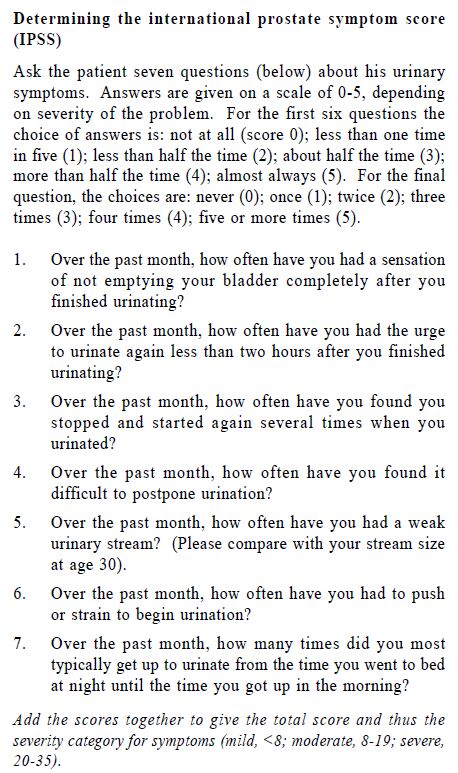10-minute consultation Prostatic symptoms*
A Farmer
HK Pract 2001;23:298-399
Summary
A 68 years old man has been urinating two or three times a night for the past six
months and is worried because two friends have similar symptoms, and one has been
told he has cancer and the other is due to have an operation, "though it isn't cancer".
What issues you should cover
- Discuss the cause of his symptoms. Show him a picture of where the prostate is and
how it causes problems. He may be worried about cancer, so explain that usually
the prostate simply enlarges but that in a small minority the symptoms are due to
cancer. About 1 in 14 men will develop prostate cancer at some point in their life.
- Discuss plans for initial investigation, including the prostate specific antigen
test. Tell him that if the test result is high then further tests will be needed,
although cancer is not the only reason for an abnormal result.
- Explain the three main options if the test results are normal: (a) try to reduce
symptoms by managing fluid intake and avoiding caffeine; (b) use medication, which
often helps but sometimes has side effects (most people start by using an α blocker,
which is likely to improve symptoms such as frequency, urgency, and poor stream
– it works quickly, but there is no evidence that it reduces long term complications
– but finasteride is an alternative drug that takes up to six months to work); (c)
consider surgery, which is usually very effective but occasionally leads to complications
(surgery is usually reserved for those with severe symptoms and for those in whom
medication has not worked).
What you should do
- Ask about urinary stream, urgency, and hesitancy. The international prostate symptom
score (IPSS) is a useful way to quantify symptoms and monitor response to treatment
(see box).

- Explore the impact of the symptoms on daily living. Are his activities constantly
interrupted, for example, by "having to nip to the loo"? Would he consider treatment
successful if he could return to normal activity?
- Ask about any worries he might have. As well as cancer, possible incontinence or
impotence after prostate surgery are other common concerns.
- Examine him. Look particularly for signs of uraemia, enlargement of the bladder,
kidneys, prostate, and palpable nodes.
- Arrange investigations: a midstream urine test to exclude urinary tract infection;
serum creatinine test to rule out renal failure; and the prostate specific antigen
test.
- Most men decide to try taking tablets, in anticipation that the test results will
be normal.
- Check blood pressure. Avoid using α blockers in people prone to postural hypotension.
- Warn that common side effects of the drugs include dizziness. Unusual side effects
are drowsiness,weakness, and dry mouth. Choose from alfuzosin, doxazosin, indoramin,
prazosin, tamsulosin, and terazosin.
- To avoid hypotension, start some of these drugs at a low dose and increase at weekly
intervals. Some drugs are available in starter packs.
- Follow up at one month to discuss results and treatment.
Useful reading
- McConnell JD, Barry MJ, Bruskewitz RC, et al. Benign Prostatic Hyperplasia: Diagnosis
and Treatment. Rockville, MD: Agency for Health Care Policy and Research. (Publication
No 94-0582).
- Benign prostatic hyperplasia. Effective Health Care 1995;2(2).
- Royal College of Surgeons of England. Guidelines on the management of men with lower
urinary tract symptoms suggesting bladder outflow obstruction. London: RCSE, 1997.
A Farmer, MBBS, MRCPsych, FHKCPsych, FHKAM(Psychiatry)
Honorary Senior Lecturer in General Practice,
Institute of Health Sciences, Oxford.
Correspondence to : Dr A Farmer, Institute of Health Sciences, Oxford OX3
7LF, U.K.
|

